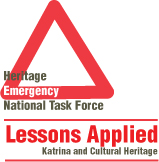18 July 2007 |
Contact: Mary Rogers |
NATIONAL TASK FORCE RELEASES NEW TOOLS TO PROTECT CULTURAL HERITAGE
Resources will aid in disaster preparedness and recovery
 |
WASHINGTON, D.C.--A new collection of handy tools designed especially for libraries, archives, museums, historic sites, and historic preservation and arts organizations has been released by the Heritage Emergency National Task Force. The tools are the result of the Task Force’s “Lessons Applied” initiative to develop practical applications for the lessons from Hurricane Katrina, such as helping cultural institutions apply for disaster aid and developing relationships with emergency responders.
The new tools are available as free downloads at www.heritageemergency.org:
- Tips for Working with Emergency Responders. Getting to know local emergency responders and how they work before disaster strikes can help keep staff and collections safe. This handy sheet tells how to find and build relationships with emergency responders, as well as what information needs to be exchanged to help responders protect cultural institutions.
- Guide to Navigating FEMA and SBA Funding. This concise Web site leads cultural institutions through the process of applying to the Small Business Administration (SBA) and FEMA for assistance after major disasters. Links put policies, application forms, and other necessary paperwork at the user’s fingertips along with simple, step-by-step instructions for the application process.
- MayDay. MayDay is an annual event that encourages cultural institutions to undertake one simple emergency preparedness task. Created by the Society of American Archivists, MayDay was expanded in 2007 to include libraries, museums, and arts and historic preservation organizations. This year hundreds of organizations promoted the message, and FEMA featured MayDay on its Web site. The Task Force has produced a list of suggested MayDay activities, as well as promotional materials.
- Recommended Professional Emergency Management Training. Most staff members want to help in the aftermath of an emergency at their institutions or in their communities. The free courses listed in this resource teach cultural heritage staff and volunteer teams about local, state, and federal disaster response frameworks already in place, as well as official protocols and structure, terminology, and key local contacts.
Panels composed of Task Force members and other experts have been working since October 2006 to prepare new resources and develop longer-term recommendations in the areas of incentives for preparedness, working with first responders, effective regional response, funding, and coordination among service organizations. The Task Force met July 17, 2007, to announce the new tools and discuss results of a member survey on Katrina, which will help the group prepare for future events. Other proposed initiatives include a preparedness poster, speakers’ bureau on cultural heritage emergencies, guidelines for mutual assistance networks, GIS standards for cultural collections, a collections stabilization fund, and a new Foundation Center guide identifying disaster resources.
The “Lessons Applied” initiative has been made possible through grants from the National Endowment for the Humanities and the Bay and Paul Foundations and the volunteer efforts of Task Force members. See the attached list for a complete roster of panel members.
The National Endowment for the Humanities (NEH) is an independent federal agency created in 1965. It is the largest funder of humanities programs in the United States. For more information, visit www.neh.gov.
Every Bit of Preparedness Helps
Co-chairs: Ingrid Bogel, Regional Alliance for Preservation
Dianne van der Reyden, Library of Congress
Ralph Canevali, National Endowment for the Humanities
David Carmicheal, Council of State Archivists
Terry Davis, American Association for State and Local History
Aimee Primeaux, Association of Regional Conservation Centers
Larry Reger, Heritage Preservation
Donna Seifert, Society for Historical Archaeology
Eryl Wentworth, American Institute for Conservation of Historic & Artistic Works
Kathleen Williams, National Historical Publications and Records Commission
Know Your First Responders
Chair: Tom Clareson, Heritage Preservation
Bonnie Curtin, National Association of Government Archives and Records Administrators
Paul Jacks, California Governor’s Office of Emergency Services
Jeff Kimball, U.S. Army Center of Military History
Jane Long, Heritage Preservation
Howard Lowell, National Archives and Records Administration
Nancy Schamu, National Conference of State Historic Preservation Officers
Vicki Walch, Council of State Archivists
Joel Wurl, National Endowment for the Humanities
Ensure Informed, Coordinated, and Expedient Response
Co-chairs: Ann Hitchcock, National Park Service
Nancy Odegaard, American Institute for Conservation of Historic & Artistic Works
Alan Aiches, Federal Emergency Management Agency
Doris Hamburg, National Archives and Records Administration
Daniel Lobo, American Institute of Architects
Jane Long, Heritage Preservation
Debbie Hess Norris, Heritage Preservation
Brian Robinson, Association for Preservation Technology
Ann Seibert, National Archives and Records Administration
Laura Word, National Endowment for the Humanities
Money Is Essential to Recovery
Chair: Emily Sheketoff, American Library Association
Alan Aiches, Federal Emergency Management Agency
Becky Brantley, Small Business Administration
Ann Hingston, National Endowment for the Arts
Larry Reger, Heritage Preservation
Steve Shwartzman, Institute of Museum and Library Services
Tony Tighe, National Endowment for the Arts
Diane Vogt-O’Connor, Library of Congress
Collaboration Leads to Effective Response
Chair: Tom Connors, Society of American Archivists
Alan Aiches, Federal Emergency Management Agency
Jeanne Drewes, Library of Congress
Conley Edwards, Council of State Archivists
Cathy Hawks, Society for the Preservation of Natural History Collections
Beth Joffrion, National Endowment for the Humanities
Mary Estelle Kennelly, Institute of Museum and Library Services
Jane Long, Heritage Preservation
Derrick Thomas, American Institute of Architects
Bill Tompkins, Smithsonian Institution
Janet Vaughan, American Association of Museums
###
The Heritage Emergency National Task Force is a partnership of 40 government agencies and national service organizations formed in 1995. An initiative of Heritage Preservation and the Federal Emergency Management Agency, the Task Force has helped to protect cultural heritage from the damaging effects of natural disasters and other emergencies. Find valuable disaster resources at the Task Force Web site, www.heritageemergency.org
For more than 30 years, Heritage Preservation has been the national, nonprofit advocate for the proper care of the objects and sites that embody our history and enrich our lives. Heritage Preservation partners with institutions, organizations, and concerned individuals who care about preserving our past.

